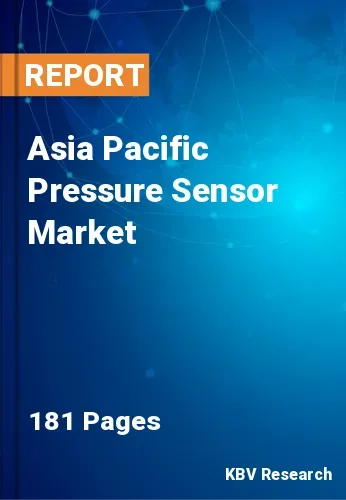The Asia Pacific Pressure Sensor Market would witness market growth of 8.2% CAGR during the forecast period (2023-2030). In the year 2021, the Asia Pacific market's volume surged to 37,645.7 thousand units, showcasing a growth of 8.2% (2019-2022).
Industries such as manufacturing, oil and gas, and aerospace rely on pressure sensors to ensure the smooth operation of their processes. These sensors are used for monitoring and controlling parameters like fluid pressure, gas pressure, and pipeline integrity. The ongoing trend towards Industry 4.0 and smart manufacturing has further accelerated the adoption of these sensors in industrial automation. Smartphones, tablets, and wearables have become an integral part of daily lives. These sensors, often found in these devices, enable features like altitude measurement, weather prediction, and touchscreen sensitivity. The increasing demand for these gadgets has boosted the market for these sensors.
Climate change concerns and the need for real-time environmental data have led to an upsurge in the sensors for weather forecasting, flood detection, and pollution control. These sensors are pivotal in maintaining the health of the planet. The aerospace and defense sectors rely on these sensors for various applications, including altitude measurement, aircraft performance monitoring, and missile guidance. The stringent safety and precision requirements in these industries make pressure sensors indispensable.
Furthermore, the sensors are used in tire pressure monitoring systems (TPMS) to ensure proper inflation, thereby enhancing vehicle safety and fuel efficiency. They are also integral in exhaust gas recirculation (EGR) systems, fuel injection systems, and airbag deployment systems. Pressure sensors monitor blood pressure, intracranial pressure, and respiratory functions. They are employed in devices like sphygmomanometers (blood pressure monitors), ventilators, and dialysis machines. Adopting minimally invasive surgical procedures also relies on these sensors for precise control.
As per the data from the Government of India, the domestic production of electronic items has increased from 3,17,331 crore (USD 49 billion) in 2016-17 to 6,40,810 crore (USD 87.1 billion) in 2021-22. India’s electronics production is expected to reach USD 300 Billion by 2026. Production Linked Incentive schemes for Phones, IT Hardware, and Electronic Components have attracted global champions while providing a fillip to domestic companies and making them national champion companies with global aspirations. Therefore, rising investments in electronics sector in the Asia Pacific region is expected to drive the expansion of the regional market.
The China market dominated the Asia Pacific Pressure Sensor Market by Country in 2022 and would continue to be a dominant market till 2030; thereby, achieving a market value of $2,968 million by 2030. The Japan market is exhibiting a CAGR of 7.5% during (2023 - 2030). Additionally, The India market would experience a CAGR of 8.9% during (2023 - 2030).
Based on Type, the market is segmented into Wired, and Wireless. Based on Product, the market is segmented into Absolute, Differential, and Gauge. Based on Technology, the market is segmented into Piezoresistive, Capacitive, Resonant Solid-State, Electromagnetic, Optical, and Others. Based on Application, the market is segmented into Automotive, Industrial, Consumer Electronics, Oil & Gas, Medical, and Others. Based on countries, the market is segmented into China, Japan, India, South Korea, Singapore, Malaysia, and Rest of Asia Pacific.
Free Valuable Insights: The Global Pressure Sensor Market is Predict to reach $28.8 Billion by 2030, at a CAGR of 7.8%
The market research report covers the analysis of key stake holders of the market. Key companies profiled in the report include Emerson Electric Co., Honeywell International, Inc., NXP Semiconductors N.V., Texas Instruments, Inc., Denso Corporation, Robert Bosch GmbH, Schneider Electric SE, ABB Ltd., Amphenol Corporation, TE Connectivity Ltd.
By Type (Volume, Thousand Units, USD Billion, 2019 to 2030)
By Product (Volume, Thousand Units, USD Billion, 2019 to 2030)
By Technology
By Application (Volume, Thousand Units, USD Billion, 2019 to 2030)
By Country (Volume, Thousand Units, USD Billion, 2019 to 2030)

Our team of dedicated experts can provide you with attractive expansion opportunities for your business.

